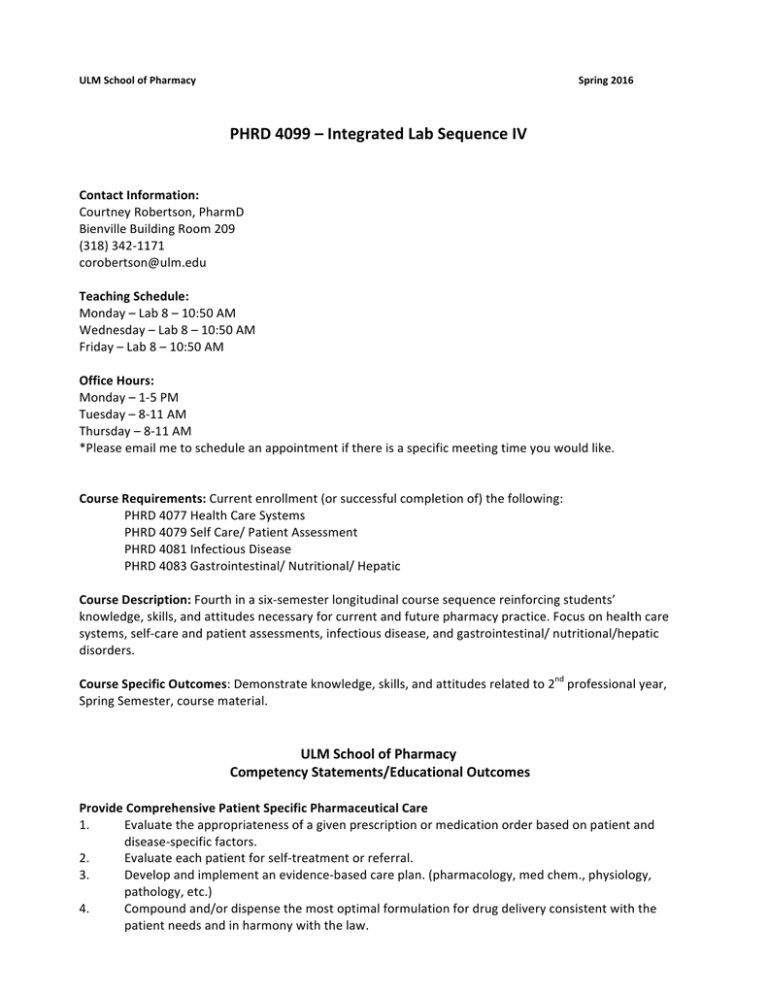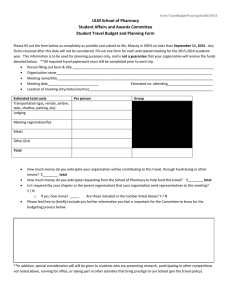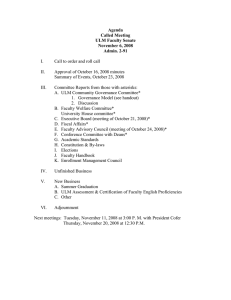Document 12068703
advertisement

ULM School of Pharmacy Spring 2016 PHRD 4099 – Integrated Lab Sequence IV Contact Information: Courtney Robertson, PharmD Bienville Building Room 209 (318) 342-­‐1171 corobertson@ulm.edu Teaching Schedule: Monday – Lab 8 – 10:50 AM Wednesday – Lab 8 – 10:50 AM Friday – Lab 8 – 10:50 AM Office Hours: Monday – 1-­‐5 PM Tuesday – 8-­‐11 AM Thursday – 8-­‐11 AM *Please email me to schedule an appointment if there is a specific meeting time you would like. Course Requirements: Current enrollment (or successful completion of) the following: PHRD 4077 Health Care Systems PHRD 4079 Self Care/ Patient Assessment PHRD 4081 Infectious Disease PHRD 4083 Gastrointestinal/ Nutritional/ Hepatic Course Description: Fourth in a six-­‐semester longitudinal course sequence reinforcing students’ knowledge, skills, and attitudes necessary for current and future pharmacy practice. Focus on health care systems, self-­‐care and patient assessments, infectious disease, and gastrointestinal/ nutritional/hepatic disorders. Course Specific Outcomes: Demonstrate knowledge, skills, and attitudes related to 2nd professional year, Spring Semester, course material. ULM School of Pharmacy Competency Statements/Educational Outcomes Provide Comprehensive Patient Specific Pharmaceutical Care 1. Evaluate the appropriateness of a given prescription or medication order based on patient and disease-­‐specific factors. 2. Evaluate each patient for self-­‐treatment or referral. 3. Develop and implement an evidence-­‐based care plan. (pharmacology, med chem., physiology, pathology, etc.) 4. Compound and/or dispense the most optimal formulation for drug delivery consistent with the patient needs and in harmony with the law. 5. Document all activities involved with the provision of comprehensive patient specific pharmaceutical care. Communicate Effectively 6. Counsel and educate patients regarding medication use, disease-­‐state management, and health maintenance. 8. Collaborate with other healthcare professionals using appropriate effective communication in both written and oral forms. 9. Read, write, speak, listen, and use data, media, and computers to send and respond effectively to communications for varied audiences and purposes. Identify, Interpret, and Evaluate Literature Needed for the Provision of Drug Information and Pharmaceutical Care 13. Define the question that needs to be answered. 14. Distinguish among lay, professional and scientific literature. 20. Draw appropriate conclusions from research results. 21. Assess the potential impact and implication of published information on current practices. Promote Health Improvement and Self-­‐Care 22. Promote/participate in effective health and disease prevention services as part of patient or population specific care. Think Critically 24. Identify, retrieve, understand, analyze, synthesize, and evaluate information needed to make informed, rational, and ethical decisions. 25. Solve complex problems that require an integration of one’s ideas and values within a context of scientific, social, cultural, legal, clinical, and ethical issues. 26. Display habits, attitudes, and values associated with mature critical thinking. Demonstrate Appropriate Interpersonal, Professional, and Ethical Behaviors 27. Maintain professional competence. 28. Represent the profession in an ethical manner. 30. Provide service to the profession and the community. 33. Accept the responsibilities embodied in the principles of pharmaceutical care. 34. Demonstrate appropriate interpersonal, intergroup, and cross-­‐cultural behaviors that promote respect and trust from peers, patients, and community members. Instructional Methods and Activities: Teaching methods may include, but are not limited to: case/scenario based teaching; problem-­‐based learning; service learning; individual/group exercises; self-­‐directed learning; errors and omissions; role playing; online teaching; applied learning; point-­‐of-­‐care testing; projects/presentations; assignments/exercises; traditional lectures and the use of technology such as Power Point, Audience Response System, Human Patient Simulation, Distance Learning, ExamSoft and Moodle. Evaluation and Grade Assignment: Weekly laboratory exercises and assignments will account for 90% of the final lab grade. Quizzes concerning assigned pre-­‐lab exercises and/or reading materials may be given at any time throughout the semester and will be counted as part of the weekly lab grade. It is extremely important to prepare for weekly laboratory exercises, as they account for the majority of the total lab grade. Professionalism will total 10% of the final lab grade. Each week, 5 points may be earned or lost. Demeanor, enthusiasm, neatness, laboratory technique will be evaluated. All points will be deducted for not wearing lab coat or for other dress code infractions, for poor condition of laboratory equipment, desk or drawer, or for poor demeanor/attitude in lab. This will be checked weekly. If benches are always clean and drawers neat and the student always wears a pharmacy jacket and conducts themself in a professional manner, all 5 points will be earned. A dress code will be enforced in this course (see section J). Food or drink is not permitted by the lab stations. You may keep a bottle of water only (no other beverage – colas or coffee) by your backpacks or lunch in your lunch bag. The faculty member(s) leading the lab will develop lab assignments. All lab exercises will total 90% of your final grade. Each lab may be worth a different number of points, but they are all weighted equally. The lab is based on a 10 point grading scale: A = 89.5 – 100 B = 79.5 – 89.4 C = 69.5 – 79.4 D = 59.5 – 69.4 F = ≤ 59.4 Exercises and/or quizzes will NOT be given early. If you have an unexcused absence, quizzes cannot be made up. Laboratory Exercises 90% Professionalism 10% Total 100% Undergraduate mid-­‐term grades will be posted on-­‐line for students to view via Banner. Mid-­‐term grades indicate a student’s status at mid-­‐semester only and do not indicate the final performance outcome of a student. Any student earning a non-­‐passing grade of “D” or “F” at mid-­‐term will be required to participate in mandatory tutoring sessions offered by the course instructor(s) until such a time that they obtain a passing average in the course. Student Portfolios: Students are required to prepare, maintain, and submit a portfolio as evidence of achievement of learning outcomes. This portfolio also reflects the student’s evolving professional growth from the beginning to the completion of the Doctor of Pharmacy program. Goals of the portfolio process: 1. Document students’ progressive achievement of the school’s competencies throughout the curriculum and practice experiences. 2. Document students’ self-­‐assessment and preceptor assessments of educational outcomes. The student’s portfolio in ExamSoft must contain the required items (artifacts) within 7 days of the activity completion. Information regarding the required artifacts for this semester will be posted to Moodle at the beginning of the semester. Since the portfolio will continue to be used in subsequent laboratory sequences, didactic courses, and professional practice experiences, completion of a satisfactory portfolio is a requirement to advance to the next semester. Following each artifact submission and at the end of each semester, reports will be generated by the Dean of Assessment to ensure that each student has submitted the appropriate artifacts. Students who have not submitted the required artifacts will receive an incomplete grade (“I”) for this course. Per the ULM Student Policy Manual “I” grades are removed only by completion of the course work, not by repeating the course. The deficiency must be met within two weeks following the completion of the semester. If not done so, the “I” grade is computed as an “F” grade. Class Policies and Procedures: At a minimum, all policies stated in the current ULM Student Policy Manual & Organizational Handbook should be followed. (http://www.ulm.edu/studentpolicy/). A. Textbook and materials: A nonprogrammable calculator may be required for some class assignments. Please have available at all times. Texts for all co-­‐requisite courses. B. Attendance Policy: Class attendance is mandatory in all pharmacy courses. Students reported for accumulating more than three unexcused absences in a course during an academic semester will be administratively dropped from the course with a “W” grade. In accordance with School of Pharmacy policy and procedure, a grade of “W” will be counted as an “F” grade with respect to academic standards. Tardiness and disruptive behavior will not be tolerated. EXCUSED ABSENCES POLICY STUDENTS MISSING A GRADED EXERCISE A student missing a graded exercise (Quiz, in-­‐class assignment, scheduled lab etc.) MUST contact the Course Coordinator via email or phone prior to the graded exercise. If a student cannot contact the Course Coordinator prior to the graded exercise, they must contact the coordinator within 24 hours of the graded exercise. It will be the sole responsibility of the Course Coordinator as to determine whether or not the student had a sufficient excuse for not contacting the Course Coordinator prior to the exam. Provided this policy is followed and a validated excuse is presented, excused absences will be granted for those reasons outlined in the University catalog and School of Pharmacy (SOP) Student Handbook. Absences outside of those covered in the University catalog and SOP Student Handbook will be excused at the discretion of the Course Coordinator. STUDENTS MISSING CLASS TIME Students MUST notify faculty of a scheduled absence (Physician Appointment, etc) prior to missing class. When possible, students SHOULD notify faculty of an unscheduled absence by phone or email prior to missing class. If a student cannot contact the Course Coordinator prior to class, they MUST contact the coordinator within 24 hours of class. Provided this policy is followed and a validated excuse is presented, excused absences will be granted for those reasons outlined in the University catalog and SOP Student Handbook. Absences outside of those covered in the University Catalog and SOP Student Handbook will be excused at the discretion of the Course Coordinator. Students SHOULD NOT miss class for drug screening; however, in the rare case where a student’s class schedule does not allow sufficient time for drug screening within the pre-­‐defined window, an excused absence will be granted by the Dean or his/her designee provided the student receives permission from the Dean’s office or the Course Coordinator to be absent prior to the absence occurring. The Dean or his/her designee will communicate this excuse in writing directly to the Course Coordinator. EXCUSE VALIDATION The Office of Student and Professional Affairs will verify the validity of all excuses. Students should bring the excuse to the Office of Student and Professional affairs before classes on the day they return to class. The Office of Student and Professional Affairs will verify the validity of the excuse and will sign and date the excuse. The student should retrieve the validated excuse on the SAME day it is dropped off in the office of Student and Professional Affairs. The student should provide the Course Coordinator with the validated excuse within two business days of its validation. CONTACTING COURSE COORDINATORS Contact information for all course coordinators is located in the syllabus for all courses; however, students are encouraged to pre-­‐program their course coordinators office phone numbers into their cell phones or keep a list of course coordinator phone numbers where they are easily accessible. Student may contact the Office of the Dean (318-­‐342-­‐1600) or the Office of Student and Professional Affairs (318-­‐342-­‐3800) for assistance. APPEALS FOR EXCUSED ABSENCES In the event that a student disagrees with a Course Coordinator’s decision concerning an excused absence, they may appeal that decision using the same pathway and timelines outlined for a grade appeal (Department Head, Associate Dean for Academic Affairs, Dean, Provost). Any appeal should include a copy of the validated excuse and a letter outlining reasons the excuse should be granted based on the School and University guidelines for excused absences. C. Make-­‐up Policy – Lab If the student has a University approved excuse for missing a quiz or lab exercise, one opportunity will be given for make-­‐up at the discretion of the instructor(s). Failure to attend a scheduled make-­‐up will result in a grade of zero (0) for that exam/exercise. Make-­‐up labs will be prepared at a similar level of difficulty and may be given as a written exam or an oral exam in the presence of another faculty member. D. Academic Integrity: Students are expected to do their own work. Unless you are assigned to do group work, it is understood that you will do your work individually. Sharing of information will NOT be tolerated. This is a violation of the ULM School of Pharmacy Code of Ethical and Professional Conduct. This and other violations can be found at the link below. Violators will be sanctioned accordingly. Faculty and students must observe the ULM published policy on Academic Dishonesty (see the ULM Student Policy Manual – http://www.ulm.edu/studentpolicy/). All students must observe the ULM School of Pharmacy Code of Ethical and Professional Conduct (http://rxweb.ulm.edu/pharmacy/policies/copcodeofconduct.pdf) E. Course Evaluation Policy: At minimum, students are expected to complete the on-­‐line course evaluation as well as any evaluation administered in class by the School of Pharmacy. F. Student Services: Information concerning student services in the School of Pharmacy can be found in the School of Pharmacy Student Handbook. In particular, pay special attention to the School’s technical standards and policies concerning students with special needs (http://www.ulm.edu/pharmacy/documents/ospa/specialneeds.pdf). ULM student services, such as Student Success Center (http://ulm.edu/cass/), Counseling Center (http://ulm.edu/counselingcenter/), and Student Health Services, is available at the following Student Services web site http://ulm.edu/studentaffairs/. If you are having problems with emotional, social, and/or behavioral issues please call any of the mental health clinics on the ULM campus to make an appointment. All services are free to ULM students, staff, and faculty, and are strictly confident. SOP Office of Student and Professional Affairs: 342-­‐3800 ULM Counseling Center: 342-­‐5220 Marriage and Family Therapy Clinic: 342-­‐5678 Community Counseling Center: 342-­‐1263 ULM HELPS (Helping Educators & Learners Prevent Suicide) Project Office: 342-­‐1335 G. Emergency Procedures: Please review the emergency escape plan in the classrooms and hallways of the Bienville building. Move quickly and orderly to the appropriate stairwell and exit the building. The meeting place for this class will be the far end of the north parking lot between Bienville and Broadmoor Blvd. Under no circumstances is the elevator to be used for emergency evacuation. Any student needing assistance should notify the professor immediately. For emergencies, to contact University Police, call 1-­‐911 from landlines and 342-­‐5350 from cell phones. H. Lab Cell Phone Policy: All cell phones should be turned off during class and stowed away in book bags near the shelves against the wall. Cell phones are not allowed by your lab bench at ANY time. Students found to be in possession of a cell phone during an examination or quiz are considered to have committed an act of academic dishonesty, charged likewise, and brought before the committee on ethical and professional conduct. I. Use of Prior Course Materials: Prior quizzes are NOT permissible to possess and distribute to other students. Students who hand down prohibited course material are in violation of the policy and the Honor Code. J. Dress Code Policy General Personal Care Standards: 1. Adequate precautions should be taken to maintain good personal hygiene. 2. Hair bonnets will be worn when compounding. 3. Nails should be well groomed, manicured and of short to medium length to facilitate compounding activities. 4. Face mask and gloves should be worn when compounding with materials that may pose a risk to you as the compounder. Appropriate Attire standards for Routine School of Pharmacy Attendance: 1. LAB COAT IS MANDATORY IN ALL PRACTICE LABS 2. Clean, professional clothing and shoes. • Neckties are mandatory for all gentlemen. • An undershirt should be worn if undergarments are visible through clothing. • Skirts should be no shorter than one inch above the knee when sitting. • Sleeveless shirts only, not spaghetti straps, halter tops, tube tops, showing of mid-­‐ drift, low cut tops or organization-­‐branded jerseys. • Casual Friday attire is not permitted in practice labs. Only exception: Official ULM SOP Spirit Day attire will be acceptable if the Spirit Day occurs on the day of a practice lab. • Dress Capri pants can be worn. • All shoes must be closed toe. Course Topics: PHRD 4099 ILS IV 2016 Tentative Schedule (The instructor reserves the right to adjust the schedule as needed AND classroom and hours of class) Labs will meet on Monday, Wednesday, and Friday from 8:00 AM to 10:50 AM Week Topic Assessment 1 Martin Luther King Holiday (1/18) *No Labs 1/18 – 1/22 2 Infectious Disease Medicinal Chemistry/ Pharmacology 1/25 – 1/29 combined/ Pharmacy Practice 3 MTM and patient work-up 2/1 – 2/5 4 Mardi Gras Holiday (2/8 – 2/10) *No Labs 2/8 – 2/12 5 Adverse Drug Event Reporting/Drug Information/Patient 2/15 – 2/19 Counseling 6 Infectious Disease Case studies/ Pharmacy Practice 2/22 – 2/26 7 Community Pharmacy Exercises – Vital Signs 2/29 – 3/4 8 Clinical Compounding Case – Pain and Pain Management 3/7 – 3/11 (PCA compounding) 9 Health Care System- Medicare Part D 3/14 – 3/18 10 3/21 – 3/25 11 3/28 – 4/1 12 4/4 – 4/8 13 4/11 – 4/15 14 4/18 – 4/22 15 4/25 – 4/29 16 5/2 – 5/6 17 5/9 – 5/13 Spring Break/ Easter Holiday (3/25 – 4/1) *No Labs Spring Break/ Easter Holiday (3/25 – 4/1) *No Labs Check Tech Exercises El Sayed/ Robertson Robertson G. Smith/ Robertson Lewis/ Robertson Caldwell/ Robertson A. Pate/ Robertson Zagar/ Robertson C. Smith/ Robertson Sampognaro/ Caldwell A. Pate/ Robertson Manor/S.Hill/ Lafitte Robertson Self-care and Patient Assessment Emergency Preparedness/Clinical cases Viral Infectious disease/Cirrhosis, Hepatic Failure, Druginduced toxicity Parenteral Nutrition lab exercises Finals Week Professor *No Labs

